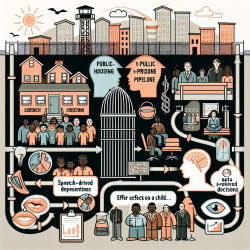Understanding the Impact of Early Developmental Delays
As practitioners in the field of special education and online therapy, understanding the nuances of developmental delays is crucial. A recent study titled Health care service for families with children at early risk of developmental delay: an All Our Families cohort study provides valuable insights into how these delays impact health care service use and costs. The study, conducted by Matthew J. Russell et al., explores the relationship between early developmental delays and the increased use of health services, offering a unique perspective for practitioners seeking to enhance their skills and knowledge.
Key Findings of the Study
The study examined 1,314 mother-child dyads, identifying 209 children (16%) at risk of developmental delay using the Ages and Stages Questionnaire (ASQ). Among these, 42 children (3%) had a reported diagnosis of a neurodevelopmental disorder (NDD). The research highlighted several critical findings:
- Children at risk of developmental delay showed increased use of allied health care services and health visits.
- Diagnoses of NDD were a significant driver of increased health care service use and costs.
- There was no significant difference in parental workforce participation or community engagement based on the risk of developmental delay.
Implications for Practitioners
These findings have several implications for practitioners working with children at risk of developmental delays:
- Enhanced Early Detection: Utilizing tools like the ASQ can help identify children at risk earlier, allowing for timely intervention and support.
- Focus on Diagnosis: Understanding that a diagnosis of NDD significantly impacts service use can guide practitioners in prioritizing diagnostic assessments and follow-up care.
- Resource Allocation: Being aware of the increased costs associated with developmental delays can help in advocating for resources and support for affected families.
Encouraging Further Research
While this study provides valuable insights, it also highlights the need for further research. Practitioners are encouraged to explore additional studies and data to deepen their understanding of developmental delays and their impact on families. By staying informed and engaged with the latest research, practitioners can continue to improve their practice and outcomes for children at risk.
To read the original research paper, please follow this link: Health care service for families with children at early risk of developmental delay: an All Our Families cohort study.










